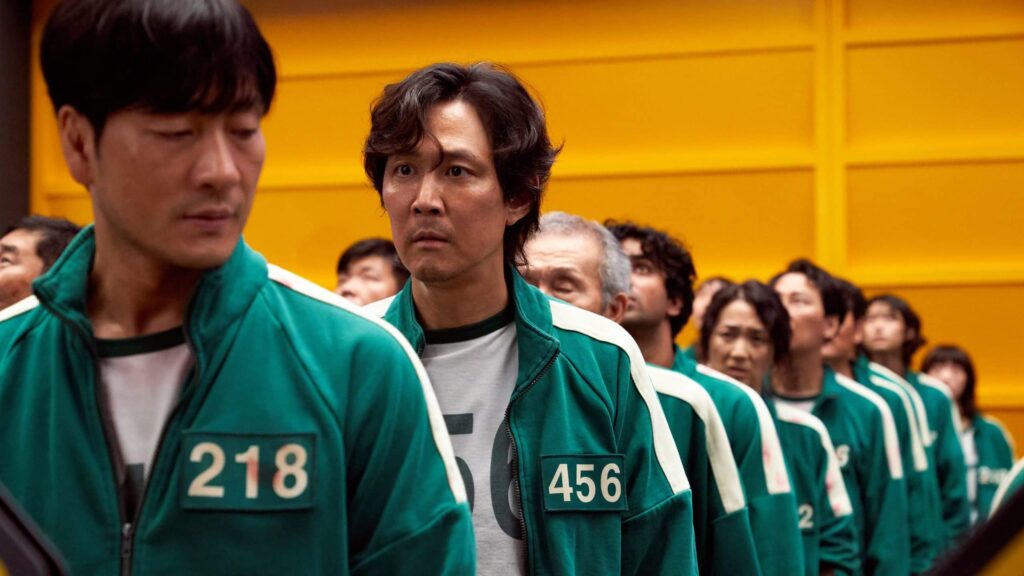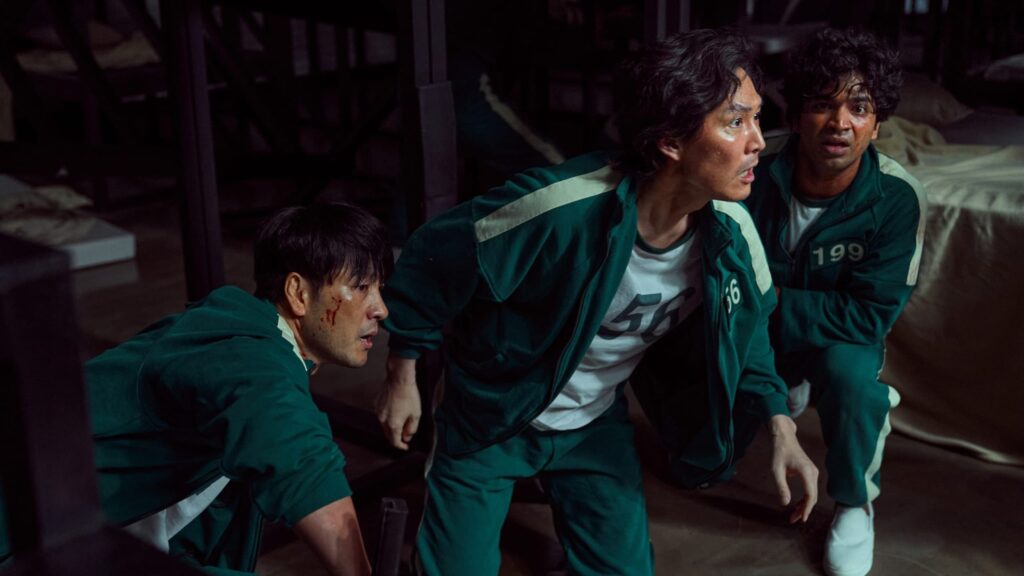Squid Game

(2021 – ), TV-MA, 55m
Table of Contents
What Is Squid Game About?
Desperate contestants risk their lives in a mysterious and deadly competition of children’s games for a chance to win a massive cash prize.
Why You Should Watch Squid Game
Squid Game has emerged as a cultural phenomenon, captivating audiences worldwide with its intense narrative and striking portrayal of a survival game. The series is a masterful blend of suspense, drama, and unexpected twists, setting a new benchmark for storytelling in the survival genre.
At the heart of Squid Game is its compelling plot – a gripping and often harrowing journey through a series of deadly games, each based on simple childhood games but with fatal consequences. The concept, though not entirely novel, is executed with a freshness and intensity that keeps viewers on the edge of their seats. The narrative is well-paced, balancing moments of extreme tension with quieter, more character-driven scenes that add depth to the story.

The strength of Squid Game also lies in its well-crafted characters. Each participant of the game brings a unique backstory, motivations, and moral complexities, making them relatable and human. The series does an excellent job of developing these characters, allowing viewers to form connections and empathize with their plights. The performances are outstanding, with each actor bringing a nuanced portrayal to their role, further enhancing the emotional impact of the series.
Another notable aspect is the creative design of the games themselves. Each game is simple in concept but executed in a way that is both visually engaging and psychologically challenging. The tension during these game sequences is palpable, and the stakes feel incredibly high, adding to the overall suspense of the series.

The series also does an excellent job of building a mysterious and foreboding world around the games. The secrecy surrounding the organization of the games, the enigmatic figures in charge, and the gradual unveiling of the larger picture add layers of intrigue to the narrative.
Squid Game is a riveting and well-executed series that has rightfully garnered global attention and acclaim. Its blend of a thrilling plot, deep character development, and high-stakes drama makes it a standout addition to the survival genre. While its graphic content may not be for everyone, its storytelling, character arcs, and suspenseful game sequences make it a must-watch for fans of intense, character-driven dramas.
The Theme of Squid Game
Squid Game, a gripping South Korean survival drama, delves into a plethora of profound themes, each intertwining to present a multifaceted commentary on society and human nature. At its core, the series is a stark exploration of economic disparity and the desperation it breeds. Through its diverse cast of characters, each representing different strata and failures of society, the show illustrates the lengths to which individuals are pushed by financial desperation. This desperation is a key driver of the plot, compelling the characters to participate in a deadly game with the slim hope of escaping their crippling debts and financial woes.
The theme of dehumanization in the face of capitalist society is another central aspect of the series. The players, referred to only by numbers, are stripped of their identities and reduced to mere pawns in a game orchestrated by unseen, wealthy elites. This reduction of human beings to expendable commodities serves as a grim metaphor for how lower economic classes are often viewed and treated within capitalistic frameworks. The stark contrast between the opulent lives of the game’s creators and the squalid conditions of the players underscores the chasm between the wealthy and the impoverished.

The series delves into the concept of moral decay and the erosion of ethical boundaries in the face of survival. As the games progress, alliances and friendships are tested, and the innate goodness of characters is challenged. This exploration of moral ambiguity questions the nature of humanity and whether dire circumstances can justify extreme actions. It also examines how competitive environments can bring out the most primal instincts in individuals, often leading to a survival-of-the-fittest scenario.
Another significant theme is the critique of spectatorship and the human tendency towards voyeurism. Squid Game subtly mirrors reality television and how society often consumes the suffering and struggles of others for entertainment. The masked VIPs in the series, who watch the games for amusement, symbolize a society that is both detached and desensitized to human suffering, as long as it is presented as a spectacle.

The impact of childhood and the loss of innocence is a recurring motif. The use of children’s games as a framework for the deadly competition serves as a poignant contrast to the loss of innocence and the harsh realities the characters face. It highlights how the simplicity and joy of childhood are corrupted and exploited in the adult world, particularly for those struggling to survive.
The series also touches on themes of social inequality and classism. The diverse backgrounds of the players – from a North Korean defector to a disgraced businessman – showcase a cross-section of society, each affected differently by the inequities and failings of the socio-economic system. The game becomes a leveling field where their backgrounds momentarily lose significance, yet the underlying societal structures and biases still subtly influence their interactions and strategies.

Lastly, Squid Game addresses themes of redemption and humanity. Despite the brutality and betrayal, moments of sacrifice, kindness, and camaraderie shine through, suggesting an inherent goodness in people despite overwhelming adversity.
The Cinematography of Squid Game
The cinematography of Squid Game is a masterful blend of visual storytelling, artistic design, and technical precision, which plays a pivotal role in creating the show’s unique atmosphere and tone. Over the course of its nine episodes, the series utilizes a variety of cinematographic techniques to enhance its narrative and thematic depth, making it a standout piece in visual storytelling.
One of the most striking aspects of Squid Game’s cinematography is its bold and deliberate use of color. The series employs a vivid and sometimes almost surreal color palette, particularly in the game environments. This choice is not just aesthetically pleasing but also serves a narrative purpose. The bright, almost candy-like colors of the game arenas starkly contrast with the drab, muted tones of the outside world. This contrast highlights the surreal and artificial nature of the games and underscores the escapism that the games represent for the players, who are all escaping desperate situations in their real lives.

The production design, closely tied to the cinematography, is meticulous and symbolically rich. The sets are designed with a focus on geometric shapes and patterns, from the iconic staircases that resemble an M.C. Escher painting to the dormitory’s honeycomb-like ceiling. These designs create a sense of entrapment and control, echoing the underlying theme of the characters being mere pawns in a larger, more sinister game.
Camera work in Squid Game is dynamic and purposeful. The cinematographers use a mix of wide shots, close-ups, and tracking shots to create a varied visual experience. Wide shots are often used to establish the scale and layout of the games, emphasizing the players’ vulnerability in the vast, controlled spaces. Close-up shots, on the other hand, are used to capture the intense emotions and psychological states of the characters, creating a deep sense of connection and empathy with the viewers.
Lighting in the series is another tool used to enhance mood and atmosphere. The bright, harsh lighting in the game arenas feels clinical and exposes the players’ every move, heightening the sense of surveillance and vulnerability. In contrast, the dim, sometimes almost shadowy lighting of the dormitory and behind-the-scenes areas adds to the mystery and foreboding that permeates the series.
The cinematography also plays with perspective to great effect. Low-angle shots are used to depict the game administrators, giving them a sense of power and dominance, while high-angle shots of the players convey their helplessness. The camera often lingers on the symbols of the games – the shapes that represent the different levels, the stark contrast of the red-clad guards against the sterile environment – reinforcing the game’s omnipresence in the characters’ lives.
The use of symmetry and asymmetry in framing scenes adds a layer of visual interest and can be interpreted as a reflection of the order and chaos that coexist in the world of Squid Game. The meticulous framing often highlights the isolation and alienation of the characters, even when they are in a group, underscoring the show’s themes of dehumanization and societal breakdown.
The Soundtrack of Squid Game
The soundtrack of Squid Game plays a vital role in setting the tone and enhancing the emotional impact of the series. It is a blend of original compositions and carefully selected existing tracks that together create a haunting and immersive auditory experience.
One of the most distinctive aspects of the soundtrack is its use of playful, almost whimsical music in stark contrast to the grim and violent nature of the games. This juxtaposition amplifies the surreal and disturbing atmosphere of the series. The original score, composed by Jung Jae-il, is a mix of orchestral and electronic music, with a tendency to lean towards minimalistic and eerie compositions. These pieces are often used to heighten the tension and drama of the games, as well as to underscore the emotional journeys of the characters.
The series also incorporates a number of classical and traditional Korean pieces, which add a layer of cultural context and depth. For instance, the use of the traditional Korean folk song “Red Light, Green Light” in a sinister and slowed-down arrangement during the first game sets a chilling tone for the series.
Some of the popular tracks from the Squid Game soundtrack include:
- “Pink Soldiers”: This became an iconic piece, representing the overall essence of the series with its eerie and mechanical rhythm.
- “Way Back then”: A melancholic track that evokes nostalgia and sadness, reflecting on the past lives of the players.
- “Dawn of the Dead”: Used in intense and suspenseful moments, heightening the sense of danger.
The soundtrack’s ability to balance the innocent with the macabre, the traditional with the modern, and the minimalistic with the dramatic, significantly contributes to the unique tone of Squid Game. It not only complements the visual storytelling but also deepens the emotional resonance of the narrative, leaving a lasting impact on the audience.
The Cast of Squid Game
- Lee Jung-jae as Seong Gi-hun (Player 456): A divorced father and a debt-ridden gambler, Gi-hun participates in the Squid Game to win money to improve his life.
- Park Hae-soo as Cho Sang-woo (Player 218): Sang-woo, Gi-hun’s childhood friend, is a former investment manager who faces financial ruin and legal trouble, prompting him to join the game.
- Jung Ho-yeon as Kang Sae-byeok (Player 067): Sae-byeok is a North Korean defector who enters the game to secure money to bring her family to South Korea and provide for her younger brother.
- Wi Ha-joon as Hwang Jun-ho: A police officer who infiltrates the game undercover to find his missing brother.
- Oh Young-soo as Oh Il-nam (Player 001): An elderly man with a brain tumor, Il-nam joins the game seeking excitement in his final days.
- Heo Sung-tae as Jang Deok-su (Player 101): A gangster with significant debts, Deok-su enters the game to escape the people he owes money to.
- Anupam Tripathi as Abdul Ali (Player 199): A Pakistani migrant worker, Ali participates in the game to provide for his family after his employer refuses to pay him.
- Kim Joo-ryoung as Han Mi-nyeo (Player 212): A mysterious and manipulative woman, Mi-nyeo joins the game for reasons that are initially unclear.
- Lee Yoo-mi as Ji-yeong (Player 240): A young woman who forms a bond with Sae-byeok. She joins the game after being released from prison.
- Gong Yoo as The Salesman: He recruits players for the game by enticing them with a simple game of ddakji.
The Filmmakers of Squid Game
- Hwang Dong-hyuk: Creator, Writer, and Director
- Kim Ji-yeon: Producer
- Hwang Seung-gi: Cinematographer
- Nam Na-young: Editor

Calamari Fra Diavolo

Inspiration
Series Title


